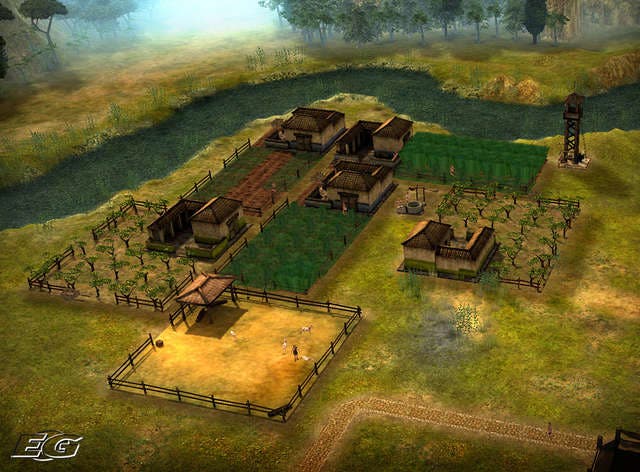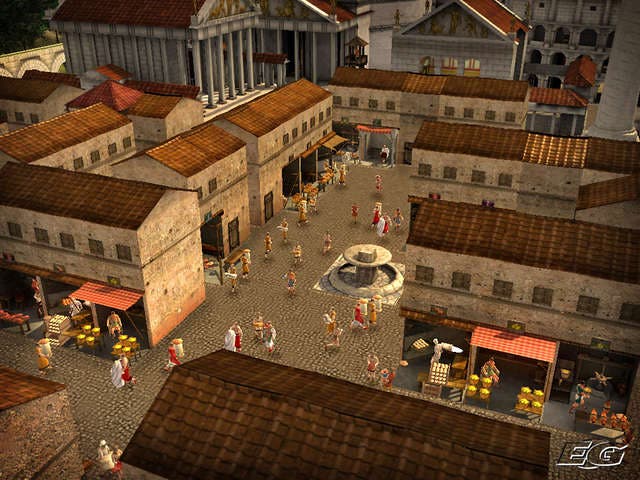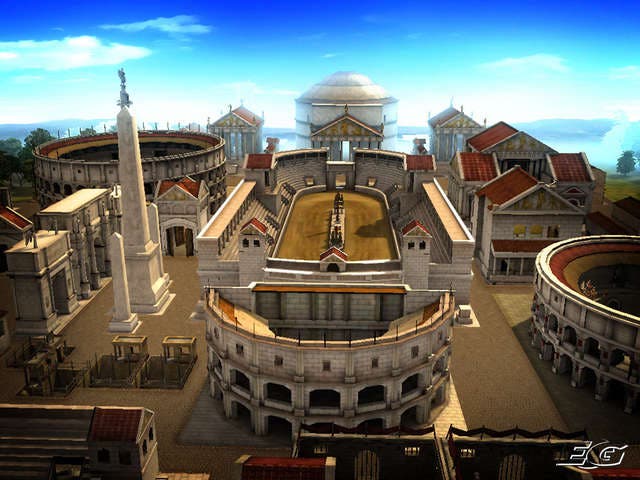CivCity: Rome
Rome was debilitated in a day.
The process must have gone something like this: Firefly contacts Firaxis, asks nicely to use its Civ franchise name; together they work out a city-based structure using all the familiar aspects of Civ, applicable to cities at any stage of civilisation; they decide on Rome as its historical connotations make it the best place to start the franchise, and they decide on a hands-off city-building structure, as that's the best way to watch all the little people doing their thing. Oh, and they throw in a military section as an afterthought. Now what do they call it?
Um, Caesar IV?
I mean, this is hardly the leap from Sim City to The Sims, where an established franchise branched out into an original, excitingly unexplored area, is it now? This is the much smaller step from one established genre to another, which someone else just happens to be predominant in. And Firefly hasn't chosen the Aztecs or the Babylonians or the Mongols or any of the thousands of other civilisations that have been studiously ignored; they've opted for the heavily-caligae-trodden roads of Rome. Even the map screen, where you trade for goods or send out armed expeditions is a poor imitation of the one from Children of the Nile. I mean, come on Firefly, the people who buy city-building games have seen the competition as well.

But is it any good? Well, yes, no and maybe. Actually, drop the yes. It's a passable replication of Caesar III with improved architecture, which makes this a city-building game, not Civilization. If you've never seen one of these before, your job is limited to building structures, shacks, temples, roads, shops, arenas and the like. (You can do this either in a campaign mode or a more sandboxy mission mode, though they're functionally the same.) Doing this creates an economic chain, which lets your shacks improve and hence increases your tax revenue while maintaining the happiness of your city-folk. As you satisfy more of your citizen's demands, they pay more tax, which allows you to keep expanding the city, which allows you to build bigger and more spectacular edifices, until the whole thing comes crashing down around your ears when it gets too complicated for your misfiring neurons to handle, or your citizens get pissed, or some natural disaster knocks the economy for six. It's basically a zoomed-in version of Sim City set in the ancient world.
Granted there are a few Civilization-esque elements added in here, to justify the branding - the Civilopaedia (which we applaud as always - Civilization should be a National Curriculum learning tool), the smiley faces measuring happiness, the research trees and the wonders. However, to players of the genre, these are all very familiar. All of these games inform you about the history of the time, most feature that iconic smiley face system and allow you to consult the populace Theme Park-style. At least the research system is new to the genre, mostly upgrading the speed at which elements of the economy operate, and the wonders are great, though unnecessary. And while most of the game is less imaginative than a spade, the actual city-building itself is solid, from the way you rotate buildings to the menu systems and information screens - if you need to find something out about your city, you can. Faint praise maybe, but surprisingly few city-builders pull this off.

Past the basics, there are a few irritations, like fresh fish in your liquamen. First, the blurb on the packet yells about the unique ability you've got in this game to "look inside buildings". Um, that's done been before, surely. In, let me think, Firefly's anaemic Stronghold 2. How short do they think our memories are? Anyway, despite our moaning, this is one part of the city that's done rather well, as you can watch your citizens go about their daily tasks, at home and work, and pop inside the arenas to see animals fight each other.
It takes an Englishman to say this, but the campaign's anglicised cut-scene voice-acting is abysmal. Fable, now there was an effective use of UK voice talent; but why do all the Romans here sound like they're games developers from Guildford? It's following the Rome: Total War trend of absurdly inappropriate accents (Ozzie Romans that time, in case you were wondering). Here's a tip for any developers reading - there are roughly twenty million people in the UK who can do a bad Italian accent, normally culled from impromptu Godfather impressions. Personally, we think that's better than something that's both inappropriate to the context and badly done. If we're wrong, throw us to the lions.
Another irritation is the cursor, incredibly. For example, merely trying to zoom out and use the demolish tool on a patch of road resulted in, whoops, a warehouse on the other side of the screen (full of carefully acquired goods necessary for the economy to function) collapsing in dust. Yes, the cursor doesn't actually point where it seems to, or indeed anywhere in the vicinity of where it seems to. There are more basic things we can imagine getting wrong, including finding your arse with both elbows, but this was pretty high on the list.

The combat system can only be described as laughable too. Each city can hold up to three forts, each holding three cohorts. You have to mine iron and make swords and, for every sword, a soldier is generated to fill up the cohorts. With fewer brains than a decapitated chicken, these soldiers are pretty much useless - you can send them into battle, but unless you can click on the speedy enemies to order an attack, the soldiers will just stand there. Thankfully, when the enemies blunder into them the soldiers' gladii (that's swords, not multiple old ladies called Gladys) spring into efficient bloody action. Next time, the developer should be honest with its ambitions, make a city-builder and just drop the combat-sim bit.
We're so het up about the imaginative poverty of this and its massive flaws that we've forgotten to put any of the standard Rome puns in. So here's a few in one bite-size lump: Rome is where the heart is, the Empire strikes back, et tu beauty?, right to Rome, seize-her, looking rubiconned, you hear they've got a pedagogue teaching in the local school, salve yourself, paxo romana, veni vidi vini, a gauling experience, infamy, infamy, they've all got it in for me...
Meantimes, we'd like to apologise to Sid Meier - this game, while not terrible, has sullied your good name and brand. Our only suggestion is to never let someone else make a game for you and to make sure the inevitable next game in the franchise explores a less familiar environ and period.







